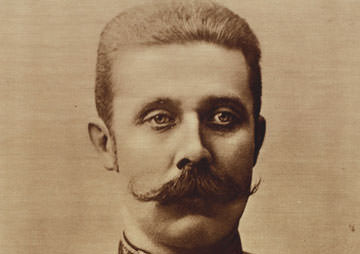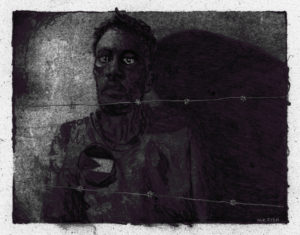History Moves, but Not Always Ahead
The weekend past saw the centenary of the assassination of the Archduke Franz-Ferdinand, with as consequence the First World War. Carl Pietzner
Carl Pietzner
Carl Pietzner
The weekend past saw the centenary of the assassination of the Archduke Franz-Ferdinand, with as consequence the First World War. The sequence of the events by which this happened has often been analyzed in the search for an answer to a much deeper question: what was behind it all? What was the ultimate mover of that war which cut a profound fissure into the history of western civilization, generally taken as responsible for the Second World War as well, and starting point for the world in which we now live?
The schoolroom explanation for war itself among the earliest human societies is rivalry over territory, resources and women. This is plausible but unproven, although the earliest legendary, literary and historical chronicles of our civilization are of wars conducted by recognizably modern men motivated by aggrandizement or greed or ego (and include the chronicle of Helen of Troy).
This would seem to have eventually evolved into the monarchical, feudal and dynastic systems of early and medieval Europe, their conflicts, the wars with Islam (both territorial and religious), and the Reformation-inspired religious wars in Europe that finally ended in the peace of Westphalia, the beginning of the modern European state system.
Long as this process took, from the Egyptian, Mesopotamian, Greek, Persian and Roman empires (leaving Asia aside) to Westphalia and the Congress of Vienna, the motivations of peoples gathered into nations seem to have been recognizably modern. Then history speeded up.
The revolutionary passions generated in dynastic Europe culminated after 1789 in the guillotine, and then in the Napoleonic Wars, attempting and failing to impose the modern state, eventually finding their resolution at the Congress of Vienna, which ended with monarchical restoration in France, and implicit confirmation of monarchical rule in Hapsburg Austria, Romanoff Russia, Prussia and the German states.
The result was called, by its critics, Enlightened Despotism. However, France, 80 years later, became a republic and that opened a new political age in Europe of constitutional monarchies, while the American Republic offered a model of representative government, above all to the component ethnic nations of Austria-Hungary.
We entered our era, still dominated by nationalism, an ancient sentiment motivated by kinship, and newly dominated by political ideology, a modern utopian millenarianism.
The Sarajevo assassination was intended by the Serbian nationalist terrorists who sponsored it to wreck the Hapsburg Empire, and it succeeded. I suppose you might say that World War I was the last of the Balkan Wars — but of course it was not; the Yugoslav Succession Wars followed in the 1990s.
The most influential political outcome of the First World War was the gratification of these nationalisms in the creation of the Baltic and Balkan republics, and amidst the wreckage of the defeated Ottoman Empire. There Arab monarchies were arbitrarily created by the Great Powers, within frontiers usually lacking historical legitimacy, and effectively the wards of Britain, France and Italy. These peoples automatically assimilated the nationalist spirit of the newly created European states. The Islamic peoples were aware of their own medieval unity in the great Caliphates and then, under the Turks, in the Ottoman Empire.
They were ripe for the explosion of Arab nationalism that followed World War II and the creation of Israel, a Jewish state forcibly inserted into historical Palestinian territories, and later, in 1967, expanded from its 1948 United Nations-assigned borders to occupy the Arab territories on the West Bank of the Jordan River, previously governed by the Hashemite monarchy in Jordan.
By then, all of the significant Arab state borders were artificial ones, drafted by British, French and Italian diplomats, U.N. mapmakers, and Israeli soldiers, but the colonial regimes imposed by Britain and France after the 1914-1918 war, or by Italy in Libya in 1910 (later a colony of Fascist Italy, and sill later an oil-rich constitutional monarchy blessed by the U.N.; and not long after that to fall to the Gaddafi revolution, overturned by NATO two years ago). All now want revenge. Meanwhile, the United States became bloated by the power it acquired during the Cold War, and became, as we were told, the Indispensible Nation in charge of world affairs.
The conclusion I draw from this oversimplified exercise in historical recall is that history moves, but not always ahead. Modest and would-be exemplary republics become self-proclaimed leaders of humanity. Victors of World War II find themselves unable to win the wars they wage against peasant societies. They combine self-righteousness with the perception of failure and decline. The Arabs of the Jihad are fascinated by their glorious past and prophesied future, envenomed by the crimes done to them, possessing dreams of grandeur leading towards self-destruction. This is likely to end badly for both.
Visit William Pfaff’s website for more on his latest book, “The Irony of Manifest Destiny: The Tragedy of America’s Foreign Policy” (Walker & Co., $25), at www.williampfaff.com.
© 2014 TRIBUNE CONTENT AGENCY, LLC.
Your support matters…Independent journalism is under threat and overshadowed by heavily funded mainstream media.
You can help level the playing field. Become a member.
Your tax-deductible contribution keeps us digging beneath the headlines to give you thought-provoking, investigative reporting and analysis that unearths what's really happening- without compromise.
Give today to support our courageous, independent journalists.






You need to be a supporter to comment.
There are currently no responses to this article.
Be the first to respond.